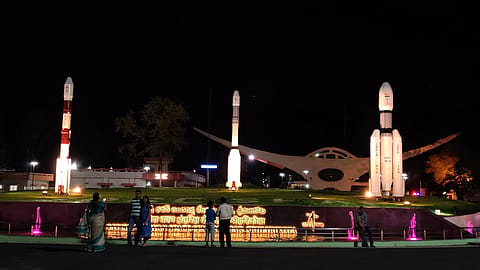Outlook 2025: Key policies, pvt investments could aid Indian space sector take off
Space startups like Skyroot and Agnikul have completed their sub-orbital launches and is expected to take the big step - orbital launch - in 2025

A series of recent initiatives by the government - start-up friendly policies, opening up the space sector to foreign investments, and public-private collaborations – could see the Indian space industry beginning to unlock its potential in 2025. Agriculture, defence and infrastructure sectors could be the early downstream beneficiaries of the space reform measures, as there are several private sector engagements in the space industry that offer tech-enabled solutions in these areas, experts say.
On the policy front, Lt. Gen. AK Bhatt (Retd.), director general, Indian Space Association (ISpA) considers this year’s (2024) announcement of the FDI policy in the space sector, allowing 100% FDI under the automatic route for satellite components and systems, up to 74% for satellite manufacturing and operation, and 49% for launch vehicles and spaceports, to be the most significant development that will steer the future growth of the Indian space industry. He is also equally appreciative of the establishment of the ₹1,000 crore venture capital fund (being managed by IN-SPACe), as an initiative to further bolster startups and private players. "The Cabinet approved Phase III of the Space-Based Surveillance (SBS-III) project, targeting the launch of 52 satellites to enhance surveillance, which would involve the manufacturing of 31 satellites by the private sector and hence would provide immense opportunities to the private industry. The year also witnessed the laying of the foundation stone for India’s second spaceport in Kulasekharapattinam, Tamil Nadu. The government’s continued focus on strategic policy reforms not only open the door for significant private sector investment but also ensure that India stays at the forefront of global space innovation," Bhatt says.
According to Bhatt, space startups like Skyroot and Agnikul have completed their sub-orbital launches and is expected to take the big step - orbital launch - in 2025. With ISRO deciding to transfer the technology for building the SSLV launch vehicle to the private players, the New Year will also see an emerging market for launch vehicle manufacturing in India. Bhatt adds that the private sector will also participate in establishing earth stations as a service due to enabling policy provisions.
Meanwhile, Apurwa Masook, CEO, SpaceFields say these measures indicate the government’s commitment to fostering long-term R&D-driven growth. "These reforms underscore the shift towards innovation led by the private sector, moving beyond ISRO’s contributions, and have catalysed the rise of spacetech startups. For the first time, we are also witnessing the emergence of space and defence-focused venture capital funds, such as Jamwant Ventures and MountTech Growth Fund – Kavachh, which have made significant maiden investments in startups," Masook says.
In terms of the opportunities for downstream sectors, communication infrastructure is expected to get a big push in 2025. The emergence of satellite communication players will help India connect every remote corner of the country thereby bridging the digital divide that exists today. The Ministry of Road Transport and Highways (MoRTH) has announced its intention to pilot a satellite-based toll collection system to replace the current FASTag system for toll payments on expressways, while in agriculture, satellite data has the potential to significantly boost banking and insurance services, and enhance crop advisory services to individual farm level across India.
Masook says that the sector awaits legislation like Space Activities Bill and Cabinet approval for the National DeepTech Startup Policy (NDTSP), both of which have the potential to make 2025 a watershed year for India’s spacetech ecosystem.